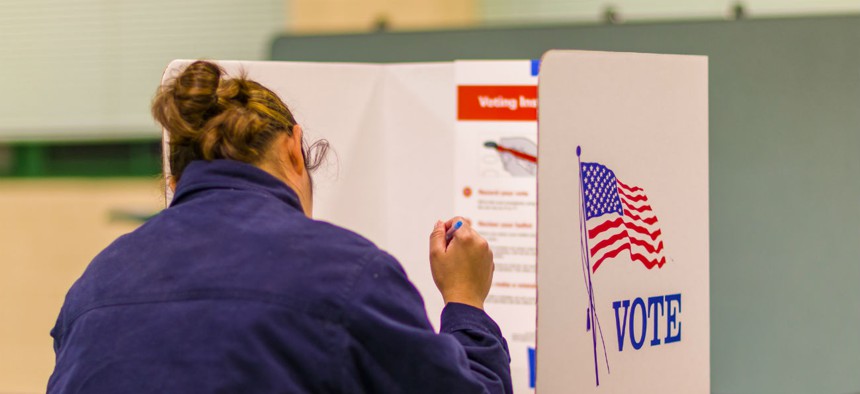
By Rob Crandall / Shutterstock.com
Election Assistance Agency Loses Its Top Leaders
The bipartisan and independent agency also faces pushback from advocacy organizations and potential funding shortages.
As the nation’s elections clearinghouse faces tight funding and criticism from advocacy groups on its new voting guidelines, the agency is losing its top two officials.
Election Assistance Commission commissioners voted in early September to not reappoint Executive Director Brian Newby and General Counsel Cliff Tatum, Politico reported. Under the previous succession plan, the chief operating officer would assume the role of acting executive director; however, that position has been vacant since 2015. Commission Chief Information and Security Officer Mona Harrington will assume the role of acting executive director on Wednesday, under the new plan, as the agency starts the search process for a permanent leader.
“The [Election Assistance Commission] is charged with providing top quality resources that support accurate, secure and accessible elections for all eligible voters,” the EAC commissioners said in a press release regarding the vacancies. “We are lock-step in our commitment to fulfilling that mandate.”
In the report on the September vote tally, obtained by the independent publication The Sunflower State Journal, the four commissioners expressed dismay they could not vote separately on Newby (a Republican) and Tatum (a Democrat). The commission voted 2-2, down party lines not to reappoint either (a decision to reappoint must have a majority). “Having [these positions] vacant going into an election year is certainly not ideal,” said Matthew Weil, director of the Bipartisan Policy Center’s Elections Project.
Newby said in an interview with The Sunflower State Journal that he believed congressional Democrats had a "clear plan" to force him out and that he had “underestimated how political D.C. is.” In casting their votes, Democrats Thomas Hicks and Vice Chair Ben Hovland denounced the voting process, but didn’t give much explanation for their decisions. Chairwoman Christy McCormick and Commissioner Donald Palmer, both Republicans, wrote about Newby’s successes during his tenure, contradicting reporting by Politico that he has tried to undermine his own agency. They also criticized Tatum.
“[Tatum] has not provided requested timely legal advice on matters, including the structure of the [Voluntary Voting System Guidelines] 2.0, [Help America Vote Act] provisions and [the National Voter Registration Act],” McCormick wrote in the tally report. “[He] has been the subject of complaints by congressional staff due to poorly cited and incomplete submissions [and] has provided incorrect advice during congressional hearings leading to media criticism.”
While she did not provide details on the incorrect advice, several election security organizations wrote in an Oct. 15 letter that the EAC “made false or misleading statements to the public and to Congress that the current [Voluntary Voting System Guidelines]...ban Internet connectivity” and cited a May hearing in which McCormick made such a claim. In the wake of 2016 election interference, security experts have expressed concern about the dangers of internet connectivity because it makes machines more susceptible to hacking.
In the Oct. 15 letter, first reported by The Washington Post, the groups also claimed the commission failed to include a ban on internet connectivity in the upcoming new voting guidelines and didn’t provide the commission’s Technical Guidelines Development Committee with all of the 50,000-plus comments regarding the ban, despite committee members asking to see them at a Sept. 19 meeting.
The discussion on creating the new voting guidelines is “ongoing and informed by a broad spectrum of experts,” EAC Communications Director Brenda Bowser Soder said. “The EAC is committed to a transparent and inclusive process as it works to finalize the next generation of voluntary voting system guidelines.”
In addition to filling the vacancies and finalizing the guidelines, the elections commission must also grapple with its lack of resources. “We have no lack of ambition to take on these challenges and help, but we need the resources to do it,” said EAC Vice Chair Ben Hovland, during a House Judiciary Committee hearing on Tuesday. “EAC’s operating budget of $7.95 million is less than the amount Kansas City spends on potholes. One city with a population of around 500,000 invests more to protect its residents’ car tires and alignment than our country invests in the only federal agency dedicated completely to improving election administration and helping more than 200 million registered voters cast their ballot.”
The Senate appropriated nearly $12 million for the Election Assistance Commission in initial versions of fiscal 2020 spending bills. This is about $2 million more than EAC received in 2019, however $1.5 million of that would be transferred to the National Institute for Standards and Technology to develop voluntary state voting system guidelines, and another $2.4 million is designated for relocating the EAC’s offices. In contrast, the House appropriated $16.2 million for the commission in fiscal 2020. Similarly, the House was more generous in allocating grant funding for state and local election administrators: the Senate designated $250 million, while the House put up $600 million.
The House and Senate have to reconcile their differences on spending bills before the stopgap spending measure that is currently keeping government open ends on Nov. 21.







